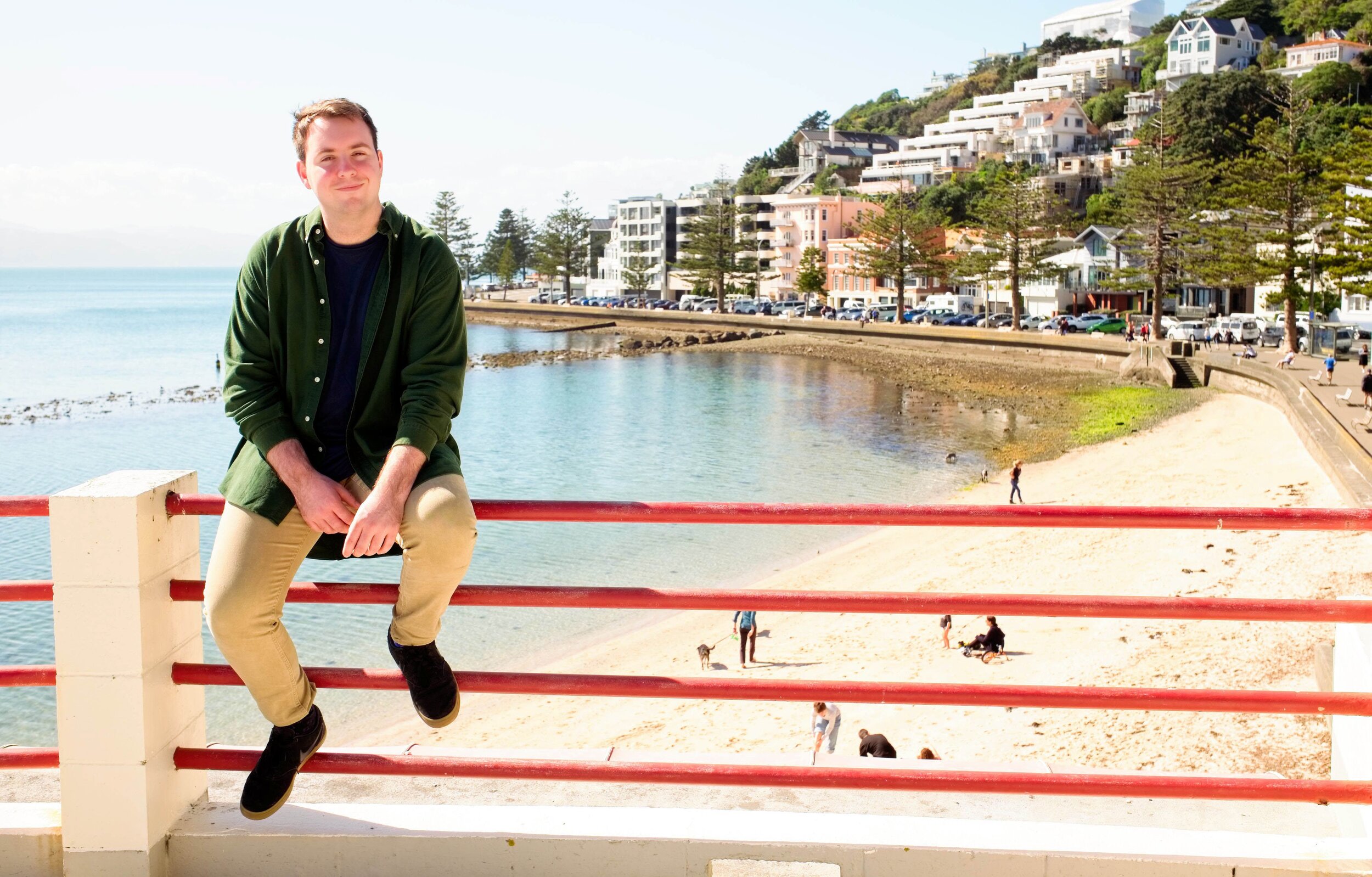DISCLAIMER: The Opoly business model described below is no longer accurate.
You can learn more about Opoly here - opoly.co.nz
Felix’s entrepreneurial journey is still valid. To read about Felix’s struggles, setbacks and what motivates him, keep on reading.
Felix is the founder of Opoly
A tech startup with its sites set on disrupting Real Estate investing in New Zealand using blockchain technology and crowd funding. Felix also co-organises one of the largest local meetup groups boasting 1200 members, Blockchain NZ (Wellington).
While auditing software for other companies and startups, Felix felt the urge to create something of his own. So, Opoly was conceived, an app providing affordable access to property investing.
What was your vision when you first started your venture?
Traditionally, to invest in property, you have two options, cash or debt. We wanted to create a third and much more accessible way. Property investing with other people in a way similar to crowdfunding. Our goal with Opoly is to provide the lowest entry barrier for anyone to earn better amounts of interest on their savings.
We want to democratise ownership of property and create a way to allow greater participation. Properties sold on our platform are split up into a thousand blocks. We call it blockifying your property. Investing in a $1000,000 property will cost as little as $100.
It's not a timeshare. People own a percentage of the investment property. In addition to that, they make money from rent earned. We get a property management company to look after each of these properties. They would take a small cut for doing that. In exchange for providing that service, our users don't have the usual rental property headaches. They can just sit back and watch their investments over time.
A part of what we're creating with Opoly is not only a process for people to sell their property, but also a marketplace where each of the property blocks can then be exchanged after the deal has gone through.
For example, if I have 100 blocks sitting on my Opoly wallet for a particular property. I could assign some or all of my blocks for somebody else to purchase.
Opoly offers a way to sell your property at a lower cost than a traditional real estate agent. Our fee is 1%, as opposed to the general average being around 3 to 4 %. Essentially, we want give somebody selling their property more flexibility. For example, a $1 million property listed on the platform would have a crowdfunding deadline. Once the deadline expires, if there has been $750,000 raised and the seller didn't achieve their $1 million goal, they could still choose to accept amount raised and keep the difference. In this case, the 25% or the 250 blocks they would retain, and they could then sell later on if they wanted.
Opoly isn’t live yet. We've still developing the platform. Right now, we have a minimum viable product. To go live with Opoly, we first need to acquire a crowdfunding license. The FMA (Financial Markets Authority) in New Zealand are the ones are responsible for issuing that. We’re currently going through the application process and will have a crowdfunding license by the end of the year (2019), if not very early next year (2020). It involves paying a fee to get the license, prove that our process is rigorous and proving that our technology is secure.
Because we're leveraging blockchain technology, there's a little bit of education involved. Blockchain technology has proven itself to be more secure than traditional systems. Look at Bitcoin as an example, it has lasted ten years already as an alternative financial system. We are using very similar technology for recording the ownership of our properties. We're using the second-largest cryptocurrency or a public blockchain system, called Ethereum.
Ethereum has something exciting and unique called smart contracts. Every time somebody buys or sells one of our property blocks, the transaction is recorded to the Ethereum blockchain. The transaction can be looked up. It's self-auditing because it's being verified by computers all over the world.
Ethereum smart contracts can't be compromised because transaction logged is incentivised. Every ledger has the incentive to report the absolute truth of all transactions because they get paid for it. If somebody tried to include a fake transaction or update, their attempt would not be included in the blockchain, and they wouldn't be paid for it. They would actually be losing economic value for doing this.
How did you deal with early setbacks?
In the beginning, there was a real focus on just the technology itself. This hindered the ability to focus on the business itself. We have our MVP (Minimum Viable Product), but there’s still so much to do to get Opoly to the market as a live product.
I wouldn't say so much it's been a setback, just a realisation of the importance to focus on the big picture. And not just the really cool tech stuff, which we enjoy the most. We’re careful with what we focus on and where we put our time.
Recently I've been learning about the financial and regulatory laws here in New Zealand. I'm learning about what a crowdfunding license is and things that you need to do to get it. It's a whole list of things I had no idea about previously. A whole new focus area for me.
When I’m really determined to succeed, I’ll find myself doing things that aren't necessarily my strengths. But I’ll go through them anyway in order to make sure my goal is met.
“Ever since I learned about it, I’ve just been down the rabbit hole and haven’t been able to stop thinking about blockchain.”
Was there a time that you wanted to give up?
I would say there has never been a time where I've wanted to give up. But that's because there’s nothing I'd rather be working on right now. I feel passionate about what we're trying to do with Opoly.
So, no, I can't say that I have had that feeling of wanting to give up. There have definitely been times when it's felt difficult. But usually, this is something that I use as fuel. I just carrying on and go through it anyway.
I have struggled when my technological expertise wasn't up to standard to complete a task. So I sought to find people who had that experience and got them on board. The people I approached really saw the vision and joined Opoly with the same level of passion and enthusiasm as me.
“The Wellington Hustle Interview Project has been brought to you by timson.co.
Headshots and Story Brand Photos. Show off your vibe and attract your tribe.”
What inspires and motivates you?
I listen to YouTube personalities. People like Gary Vaynerchuk and Ryan Serhant.
Ryan Serhant is from the TV show, Million Dollar Listing New York. And he's very much a hustler and salesman. He sells property and has great advice on presenting yourself in public and speaking engagements.
Gary Vaynerchuk is a social media influencer with a lot of great advice on how to spread your brand online. I think he's demonstrated that quite successfully. So I like to emulate some of the things that he's doing.
I listen to the Joe Rogan podcast and David Goggins is somebody that I've been listening to for motivation.
I look at all of these people as if they were mentors. Even though I've never met them, I think they share a lot of valuable knowledge that anyone in the startup world could benefit from.
Can you describe a breakthrough that you're particularly proud of?
Finding a group of people who have the same vision and passion as me for Opoly. The people involved so far have been the reason why I’ve been able to continue. I would say that's been the biggest breakthrough. I’ve learned that networking is extremely important. I met all of these people through either networking or working with them previously. There are meetups where you can find like-minded people. It's all about being open to meeting new people and getting yourself out there.
I co-founded the Blockchain Wellington meetup. We have just past 1300 members and we’re one of the bigger meetups in Wellington. There's a lot of tech geeks in Wellington working on nerdy stuff.
I should plug the Blockchain Association of New Zealand that was recently set up. They're working towards educating businesses and government on blockchain technology, implications for use and its future.
Has your vision always been clear and how has it evolved?
It's always been clear that Opoly would be a way to enable greater access for people to invest in property on their own.
I actually came up with the name Opoly by looking up what is the opposite of a monopoly. And one word that came up was ‘polyopoly’. So originally, I was thinking of calling the app ’polyopoly’. I realised that might be a bit of a mouthful. So I shortened it to Opoly.
One of our biggest motivations is interest rates in New Zealand. Even just recently, they have been cut by a half percent. So, the base rate now is 0.25%. Essentially, if we can create a solution where anyone with spare savings can just download an app and invest that into property, we feel pretty confident that in most cases, this could be a great alternative to grow your savings.
What have you implemented for your brand? What was the impact?
Brand to me is connecting with an audience and creating a point of difference where people can resonate with you. It's about having something that's clear to your audience.
We've been implementing an awareness campaign. We joined the New Zealand Blockchain Association. A lot of New Zealand companies have joined. We were able to get recognised by these businesses as an early adopter of blockchain technology.
Do you have any tips for others striving to improve their brand?
In the end, it all comes down to getting your brand out there. Just go out there as much as possible and talk to as many people as you can about what you do and why. Connect with your audience or potential users as well. Ask them what it is they're looking for. If it resonates with you, then use that feedback and incorporate it into your brand.
Connect with Felix
If you have enjoyed this article and want to start a conversation with Felix, you can reach out by:
Website: opoly.one
LinkedIn: linkedin.com/in/felix-watkins/
Medium blog
Please don’t forget to tell Felix that I sent you.
Interview and photography by Professional Headshot Photographer, Tim Morrison (all rights reserved)








